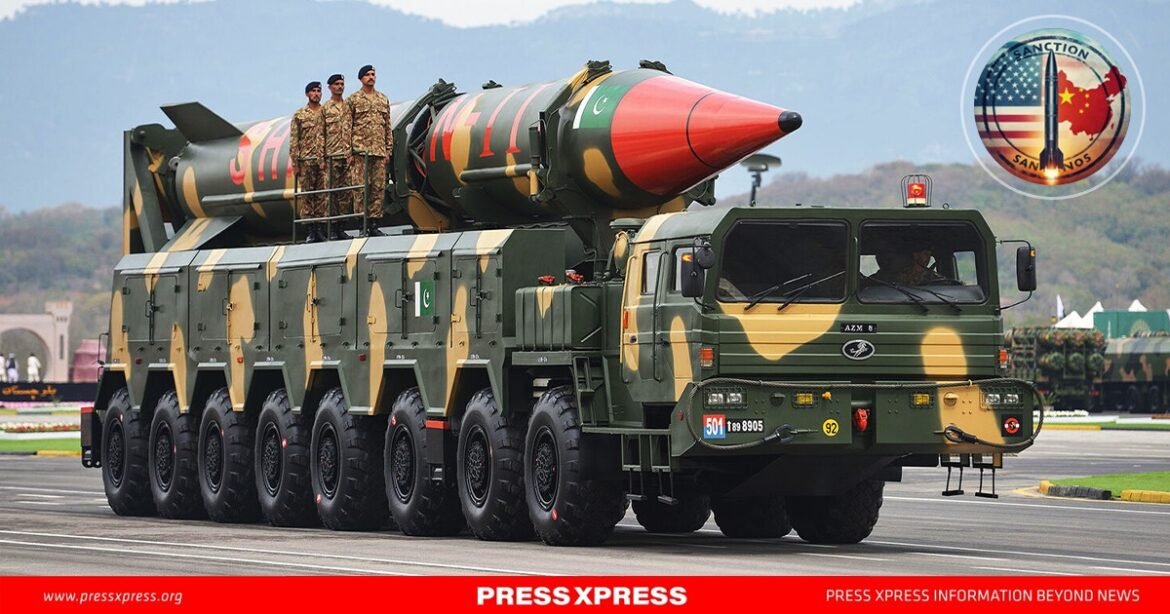The U.S. sanctions on Pakistan’s missile program highlight a growing nonproliferation challenge with significant implications for Beijing’s defense ties and Islamabad’s strategic ambitions.
In December 2024, the U.S. administration-imposed sanctions on several Pakistani entities, citing concerns over missile proliferation. Among the sanctioned entities is the National Development Complex (NDC), a cornerstone of Pakistan’s missile and nuclear weapons program, alongside several shadowy firms allegedly facilitating sensitive technology transfers. While these sanctions directly target Islamabad, they carry significant implications for Beijing—a key player in Pakistan’s defense landscape—highlighting a complex geopolitical web.

A Pakistani-made Shaheen-III missile, capable of carrying nuclear warheads, is displayed during a military parade in Islamabad, March 23, 2022.
The National Development Complex
Established in 1990, the NDC has played a pivotal role in Pakistan’s missile development, contributing to systems like the Shaheen and Nasr series. These missiles, reportedly derived from Chinese designs, underscore deep Sino-Pakistani defense collaboration. In 2024, the NDC’s efforts culminated in several high-profile advancements:
- Shaheen Training Launch: Achieving a 2,750 km range, this development aligns with Pakistan’s stated objective of “full spectrum deterrence,” extending its strategic reach to potentially target U.S. bases in the Middle East.
- MIRV Capability: The Ababeel missile test introduced multiple independent re-entry vehicle (MIRV) technology, enhancing Pakistan’s ability to counter Ballistic Missile Defense (BMD) systems.
- Naval Ballistic Missile: A missile launched from the Zulfikar-class frigate showcased growing naval capabilities, reflecting potential collaboration with Chinese engineers stationed in Karachi.
These advancements underline Pakistan’s expanding military capabilities, raising alarm in Washington and beyond.
Shadow Networks and Smuggling
The U.S. sanctions also target entities like Rockside Enterprise and Akhtar and Sons, which appear to operate as shell companies. These firms echo the infamous AQ Khan network—a web of illicit transactions facilitating nuclear and missile technology proliferation across multiple nations, including Iran and North Korea.
Sanctions aim to cut off these entities from global markets, though enforcement challenges persist. The dual-use nature of many technologies—suitable for both civilian and military applications—complicates monitoring and control efforts. For instance, sanctions targeting NDC may have limited immediate impact, given its reliance on China for critical supplies rather than Western sources. Nonetheless, these measures send a broader signal to international suppliers about the risks of engaging with such networks.
China’s Role and Risks
China’s involvement in Pakistan’s defense sector is well-documented, with Beijing serving as a primary supplier of military hardware and technology. The Hangor-class submarines, for instance, exemplify this partnership. Despite delays due to Germany’s refusal to provide diesel engines, China’s steadfast support has ensured progress, with key milestones achieved in 2024.
However, the U.S. sanctions indirectly place Chinese firms under scrutiny. If Beijing continues its support for sanctioned Pakistani entities, its companies risk being drawn into the sanctions framework. This potential exposure could deter international partnerships and disrupt China’s global supply chains—an outcome Beijing cannot afford amidst its ambitious Belt and Road Initiative and other strategic objectives.

Pakistan conducts successful launch of missile Shaheen-II in August 2024
Implications for U.S.-China Relations
The sanctions also highlight a broader strategic contest between the U.S. and China. By targeting Pakistan’s missile program, Washington not only curtails Islamabad’s capabilities but also signals its resolve to counter China’s growing influence in South Asia. This aligns with the U.S.’ Indo-Pacific strategy, aimed at containing Beijing’s military and economic clout.
For Beijing, these developments present a dilemma. While its support for Pakistan bolsters a key regional ally, the associated risks could undermine its own economic and technological ambitions. Balancing these competing interests will require careful calibration by Chinese policymakers.
Pakistan’s Response and Regional Dynamics
Unsurprisingly, Pakistan has decried the sanctions as evidence of “double standards,” pointing to the absence of similar measures against India. While over 70 Indian firms have faced U.S. sanctions, these actions have primarily targeted legally sanctioned transactions, such as arms sales to Russia, without implicating state-sponsored proliferation networks. In contrast, Pakistan’s missile and nuclear programs heavily rely on international procurement, heightening scrutiny.
India’s approach to export controls offers a stark contrast. Following U.S. sanctions, New Delhi has tightened regulations to prevent unauthorized transfers of dual-use technologies. This proactive stance underscores a commitment to international norms, bolstering India’s standing as a responsible global actor.
Strategic Implications
The U.S. sanctions reflect a broader effort to curb proliferation risks and reinforce nonproliferation norms. However, their effectiveness hinges on international cooperation, particularly among key suppliers like China. For Beijing, the sanctions serve as a warning: continued engagement with Pakistani entities could jeopardize its own strategic interests, from access to critical technologies to participation in global markets.
For Pakistan, the sanctions underscore the vulnerabilities of its dependence on external support for its defense programs. Addressing these challenges will require not only diversifying suppliers but also enhancing domestic capabilities to reduce reliance on external actors.
Lastly, the U.S. sanctions on Pakistan’s missile program represent a multifaceted challenge with implications for Islamabad, Beijing, and Washington alike. While aimed at curbing proliferation risks, these measures also highlight the interconnectedness of global supply chains and the geopolitical stakes at play. As the situation unfolds, stakeholders must navigate a complex landscape where strategic interests and nonproliferation goals intersect, shaping the contours of regional and global security dynamics.


